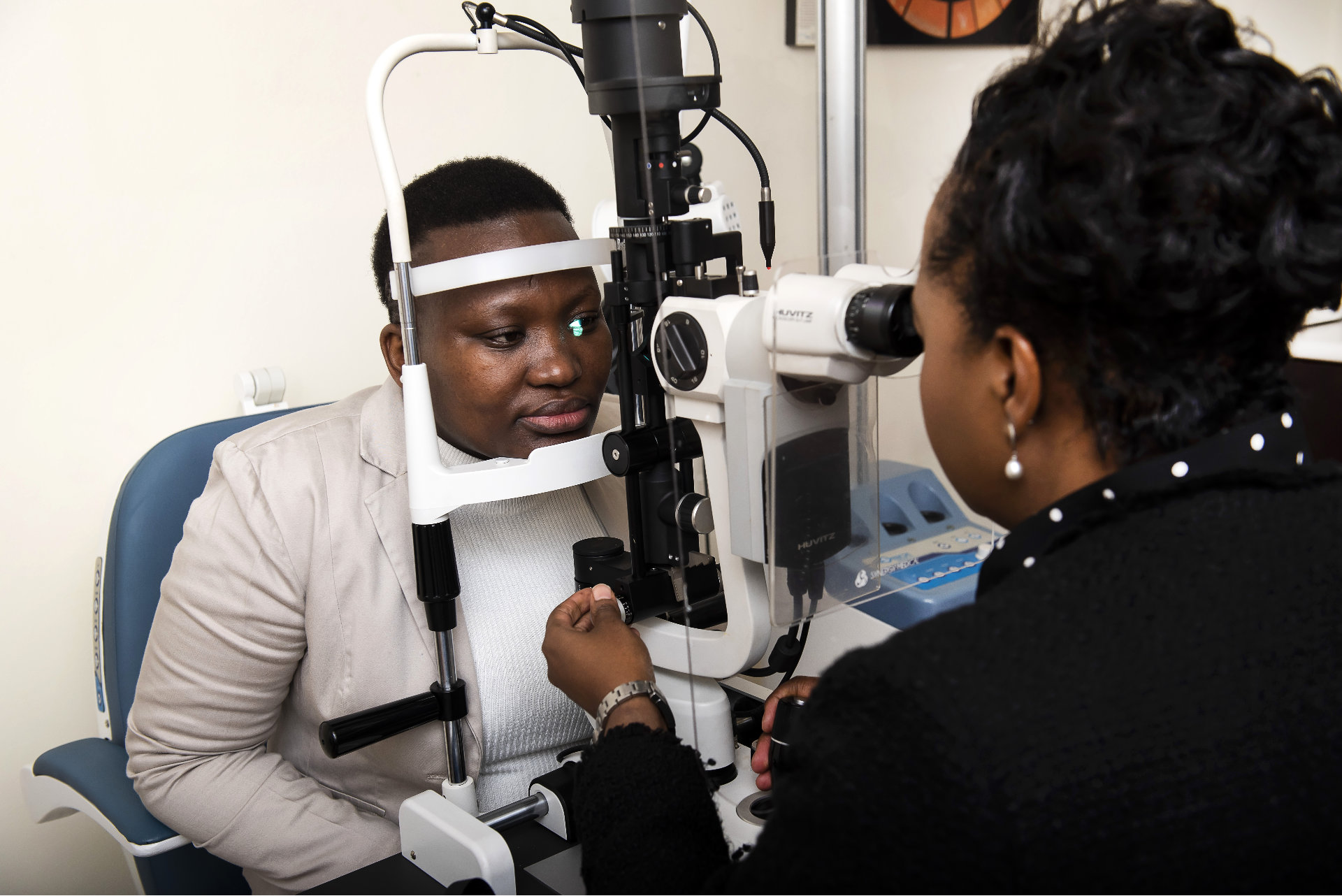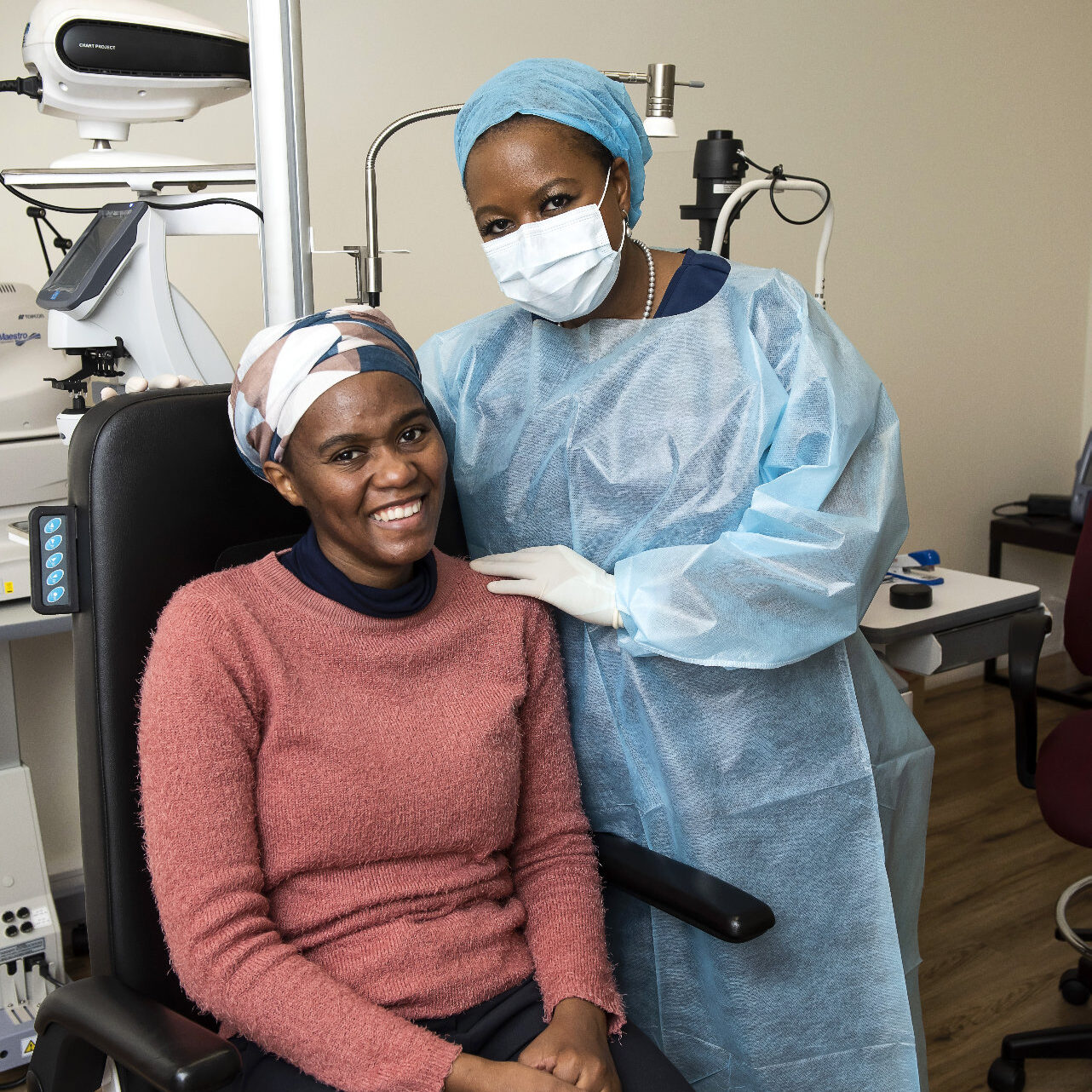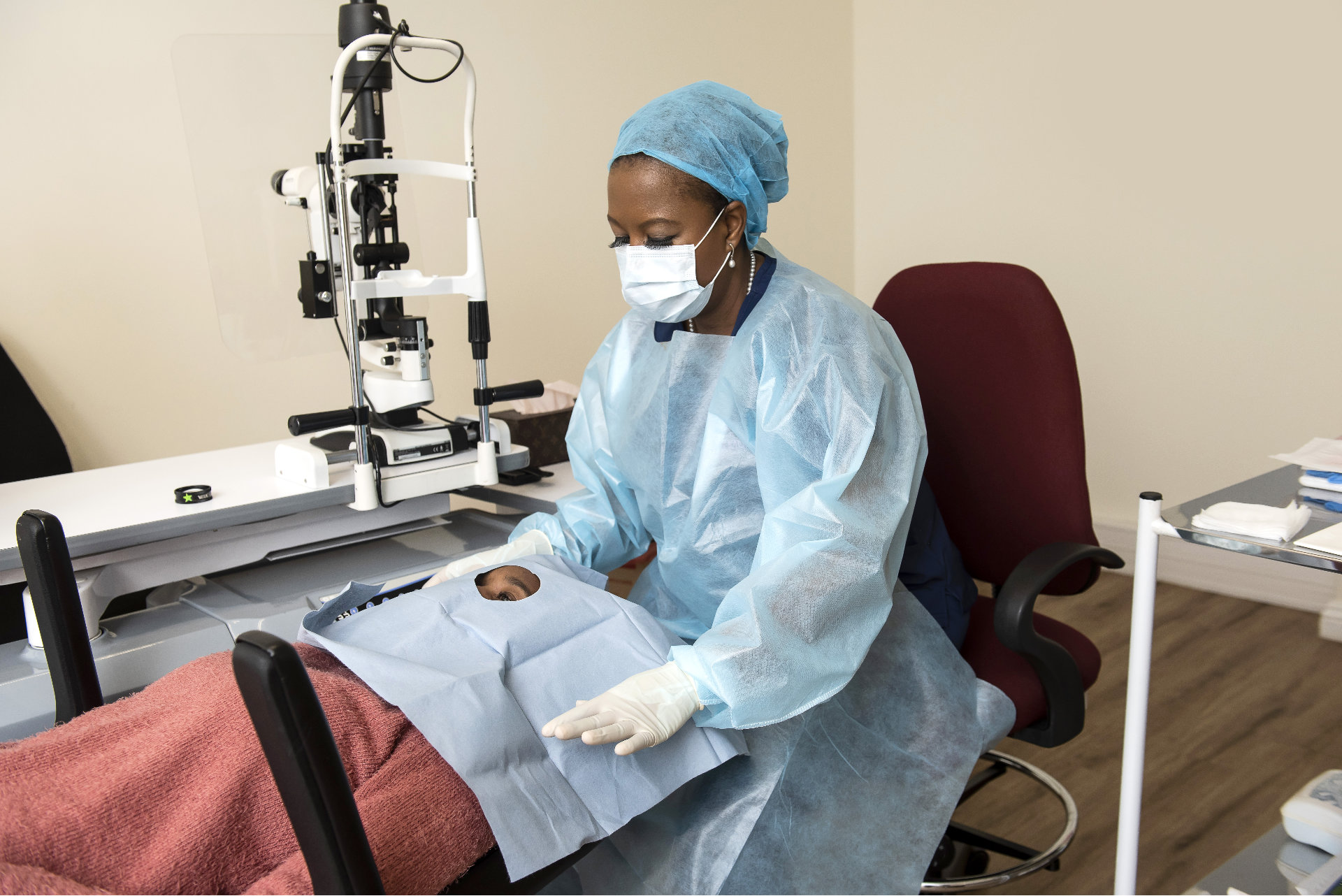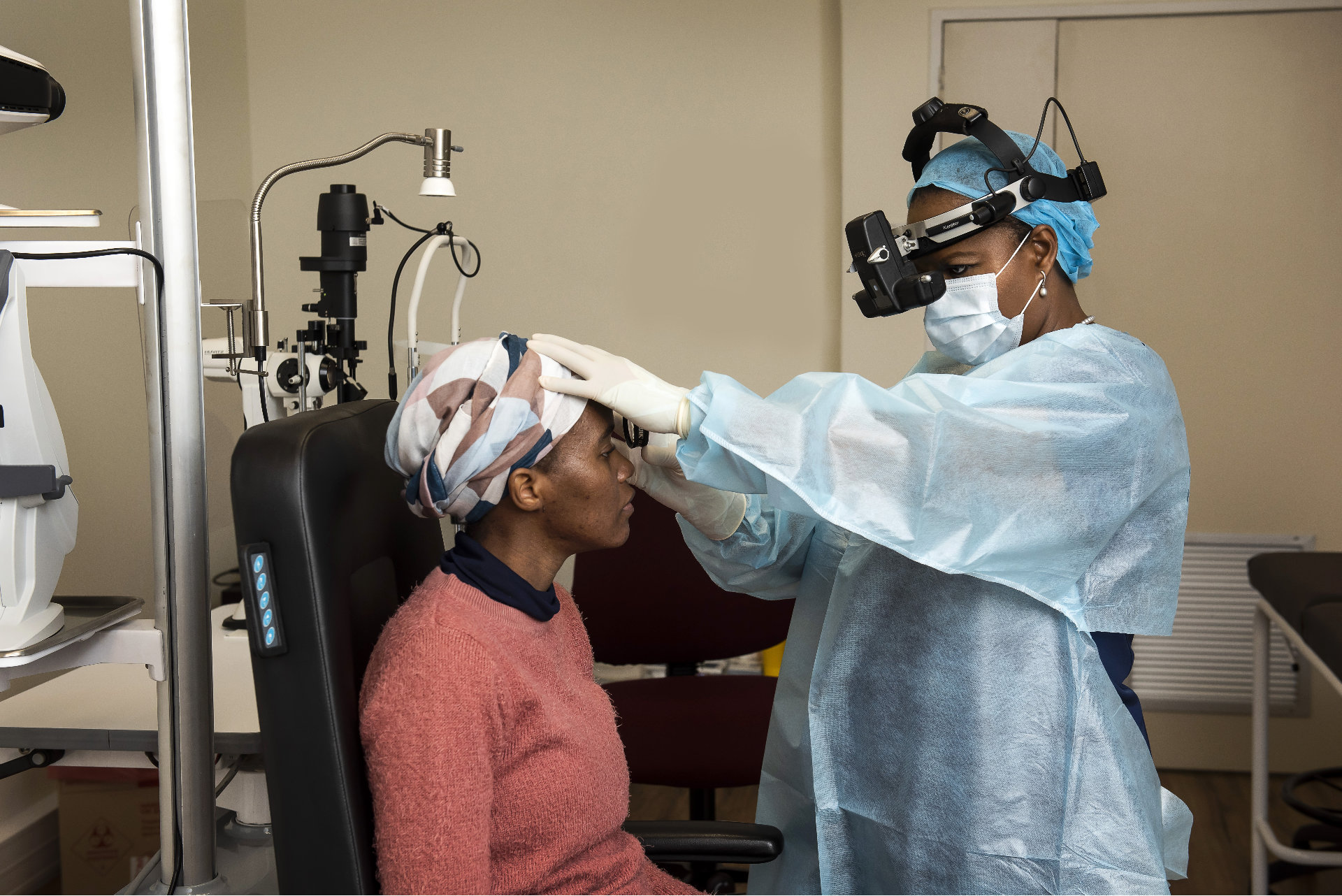DR SINEZIWE MULONGA - ophthalmologist
Bringing ophthalmic excellence to Durban

Durban’s eye specialist
Blink twice if you know what an ophthalmologist is. The short answer is simple: eye doctor. The long answer isn’t. Ophthalmologists are specialist eye care doctors, highly skilled at remedying some of the eye’s most devastating afflictions.
Close your eyes and imagine you could never open them again. What would you miss seeing? The faces of your beloved friends and family? The deep blue sky on a perfect summer’s day? Nobody wants to lose their sight, and the effect this has on one’s lifestyle is often tragic.
Eye problems can strike at any age, but we become more susceptible as we grow older. Luckily, there are experts in field who can assist with cataracts, retinal detachment, floaters, and a collection of other eye-related issues.
In an effort to shed some light on this niche medical profession, this article with look at what ophthalmology is, common eye problems that affect us, how ophthalmic surgeons help with these issues, and when you should see an eye specialist.
What is ophthalmology?
Ophthalmology is the study of eye disorders, and an ophthalmologist is someone that remedies eye disorders. They treat issues specifically associated with the eyeballs, including eyelid lumps and bumps affecting the eyelid, like styes and droopy eyelids (ptosis).
Affectionately called eye doctors or eye care specialists, ophthalmologists diagnose and monitor eye and vision complications, commonly prescribing and fitting glasses or contact lenses in order to correct eye problems.
Most patients that grace the waiting areas of ophthalmic surgeries are referrals from general practitioners, optometrists, and other medical professionals.
Some ophthalmologists practice in a general sense, whereasother ophthalmology subspecialists focus in on a very specific eye-related problem, like cataracts, astigmatism and retinal diseases.

common eye problems:
cataracts
Coming in as a very common eye problem, which is cloudiness of the lens when overmature, it may be dense white and milky. Thankfully, we don't see white cataracts in recent times. This affliction develops on the lens itself turns cloudy.
Cataracts render vision blurry and dull, and worsen as the person ages. The eye’s lens is made of special transparent proteins and water. Over time, these proteins cluster together into dense bundles that start preventing light from passing through the eye to the retina.
astigmatism
This eye disorder involves the cornea, and affects our eyes’ refractive capabilities (the way light passes to the retina). In astigmatism cases, the person’s cornea (front part of the eye) is an irregular shape, or has an irregular curve to it.
This can cause blurry or distorted vision if not treated. Other issues that may be associated with astigmatism include nearsightedness and farsightedness.

glaucoma
Eye doctors also treat plenty of patients suffering from glaucoma, a title referring to a range of problems that can affect the optic nerve. The real issue with glaucoma is that it will cause blindness if left untreated.
It usually results from a build-up of pressure in the eye, thanks to aqueous humor (naturally-occurring fluid in the eye) that does not drain efficiently out of the eye.If you have first degree relatives with glaucoma, like mom or dad, you should be screened from the age of forty and once every two years.
diabetic retinopathy
This eye condition is, as the name suggests, related to diabetes. This issue will affect those living with diabetes if they do not keep blood sugar levels under control. High blood pressure is often a twin, and if uncontrolled can exacerbate diabetic eye disease. Diabetic eye disease can be asymptomatic, or bleeding may occur at the back of the eye.
Patients literally see red (not because they are angry but because of the blood), and a shower of many black dots which they may confuse with “floaters.” These appear in one’s vision, and can take the form of dots, strings, cobwebs or squiggles. Floaters themselves may be innocuous or sinister, so new floaters should always be reported.
Active diabetic retinopathy can be treated in the rooms with laser, which discourages new vessels from growing in the back of the eye, or through use of an injection into the eye. The two methods can be combined. The eye is numbed so pain will be the least of your concerns.
Some people might require surgery at a later stage despite treatment modalities mentioned earlier. The surgery involved is a vitrectomy, which is used to remove scar tissue and leaked blood from the affected eye(s).
How an ophthalmic surgeon can help:
-
Cataract surgery
This ophthalmic procedure takes less than an hour, and involves the replacement of a patient’s cloudy lens with a crystal-clear artificial one. The good news is that cataract surgery is an outpatient procedure, so no need to spend any time in hospital recovering. Vision will be blurry immediately after the procedure, correcting within a few days, and eyes can feel itchy or uncomfortable while healing.Modern day techniques can offer you clear vision as you step out of the hospital bed.
-
Floaters surgery
This treatment modality is only reserved for a select few with bothersome visually debilitating floaters that affect their field of vision, and come to view when driving for example. Avitrectomy is offered in this case, which is keyhole surgery that aims to remove the jelly at the back of the eye which is part of the floater.

-
Glaucoma surgery
There are many procedures that can treat glaucoma. They range from minimally invasive to aggressive surgery, all with the intention of reducing the pressure in the affected eye and preventing blindness. Laser surgery is the most common choice for mild pressure, since most patients are able to return to their daily activities the very next day. When laser surgery is not possible for a glaucoma patient, the conventional treatment is administered. This leaves the eyes red and uncomfortable, and may takes the patient up to a week to return to normal life.
-
LASIK surgery
Short for laser-assisted in situ keratomileusis, LASIK surgery involves a laser removing tissue under the surface of the cornea, changing its shape and assisting with nearsightedness, farsightedness, and astigmatism. The outpatient procedure takes around 30 minutes to teat both eyes, and patients are able to see an improvement in their vision immediately and improvement within a day or two of the surgery.
signs you should see an ophthalmologist:
changes in vision
This refers to eye changes that can result in visual phenomena, including watery vision, flashes of light, sudden spots, blurred vision, or double vision.
field of vision changes
This symptom is often the most frightening one for sufferers, and includes seeing random shadows, strange black spots, curtain-like loss, and central or peripheral vision blurriness.
changes in colour perception
Suddenly seeing colours differently is also a sign of concerning eye troubles, and should ideally be seen to by an ophthalmologist as soon as possible.
physical changes
The eye is also prone to undergo physical changes, including redness, swelling, discharge, crossed eyes, or eyes that are misaligned (squint), especially if one is not born with a squint
lost/reduced vision
The most common sign of eye troubles, especially as people age, is the slow or rapid onset of reduced vision – in one or both eyes – that gets progressively worse as the person ages.
How to prepare for an eye operation:
-
Avoid eye makeup
Hidden makeup debris on the eye’s lashes can increase the risk of infection. Avoid wearing any eye makeup for one or two days before your eye surgery, and gently wash your eyes a few times leading up to the surgery to make sure no makeup particles are lingering.
-
arrange assistance
Depending on your eye operation, you might not be able to drive yourself home after the surgery. You’ll need to employ the services of a carer who will see that you get home safely. Some patients might need caring for days after their operation.
-
avoid screens
The night before your eye operation should be spent in peace, quiet, and darkness. The eyes should be given chance to rest, so avoid using devices such as laptops, computers, mobile phones, tablets, and other electronic devices a day before your procedure.

-
choose glasses
Wearer contact lenses? Soft lens wearers should stop wearing contacts one week prior to surgery, while hard lens wearers should try go contact free for at least three weeks before the operation. Contacts alter the shape of the cornea, which could lead to incorrect measurements.
-
go comfortable
Lasers of this nature operate best in cool environments. For this reason, the room you are operated on might be on the chilly side. Wear something warmish to make sure you don’t shiver throughout the procedure, but avoid anything woolen or fluffy.
finding the right ophthalmologist in durban
Our eyes might be the windows to our souls, but they are also our windows to the world. The importance of looking after your eyes can’t be overstated, and too often easily-treatable issues are missed early on and end up becoming serious conditions. It’s important to consult a GP or optometrist as soon as eye troubles are noticed, or approach an ophthalmologist in your community directly if you are certain of what afflicts your eyes.
Doctor Sineziwe Mulonga is the first black female ophthalmology graduate from the University of KwaZulu-Natal (UKZN). As a caring, compassionate, passionate expert in the field of retinal diseases, Dr Mulonga has over two decades of experience as a medical doctor, practicing medicine in the UK and South Africa before specialising. Durban’s specialist eye doctor is affiliated with the Ophthalmology Society of South Africa (OSSA), the Health Professions Council of South Africa (HPCS), and the South African Medical Association (SAMA).
Dr Mulonga practices exclusively out of Entabeni Life Hospital in Durban’s eyecare centre (first floor). The location of the practice gives easy access to endocrynologists, neurologists, pediatric professionals, laboratories, and x-ray facilities. This makes it easier and more efficient to arrive at a sound treatment and care plan. If you feel that your eyes need attention, book an eye doctor appointment with Dr Mulonga today.
Eye Specialist & Opthalamic Surgeon
Make an appointment
Dr Sineziwe Mulonga is an Ophthalmologist, a specialist eye surgeon for treatment of medical eye conditions, specialising in surgical and medical retina.
We pride ourselves in providing you with a professional environment and we aim to please all our patients
